In his younger life Bill would not have imagined he would become a third generation nurse. But the path he chose came in handy later in life to help a once abused dog heal his hidden wounds.
School’s out
Bill was born in Cleveland, but by age seven moved to Staten Island, New York and soon after the Bronx. Following his parents divorce he moved once again, to Manhattan. He excelled in baseball and football until injuries sidelined his athletic pursuits.
Education was not a top priority for Bill. He dropped out of high school, enlisted in the Navy, and served one tour of duty.
“If I like it, great,” he recalls. “If not, I’ll think of something else to do.”
During his Navy obligation Bill served as an interior communications electrician. In this role he was responsible for all communications aboard the ship.
“We were like two kids with tin cans on a string, except with handset phones,” he says. “The whole flight deck was hooked up to the communication system like an old-fashioned party line.”
To the fifth degree
In time Bill warmed up to the idea of higher education. He jokes about having many degrees despite not finishing high school with his peers.
“I was a high school dropout with five college degrees, two associates, two bachelors, and a masters.”
At the time Bill finished his Navy tour the City University in New York offered night classes. Students did not have to provide a high school diploma to enroll. Bill admits the courses were geared towards immigrants, but he signed up anyway.
The Navy veteran earned an associates degree in general education. Thereafter he went to summer school to earn his high school diploma. He admits his path was unconventional.
“I had my degrees hanging on a wall. My friends would look at them and notice they were out of order,” he says. “College degree, high school diploma, college degree.”
But Bill was not done with school. He would go back to complete a bachelor’s of science in education. When New York City laid off teachers he worked part-time as a trainer for people with sports injuries. He drove a taxi cab as well.
And then the ambitious veteran used the GI Bill to earn an associates degree in nursing.
Love lost
During this time Bill had married. Eventually his wife was diagnosed with cancer, which inspired Bill to finish his degree. The same year his wife passed away the Navy veteran graduated with a bachelor’s degree in nursing.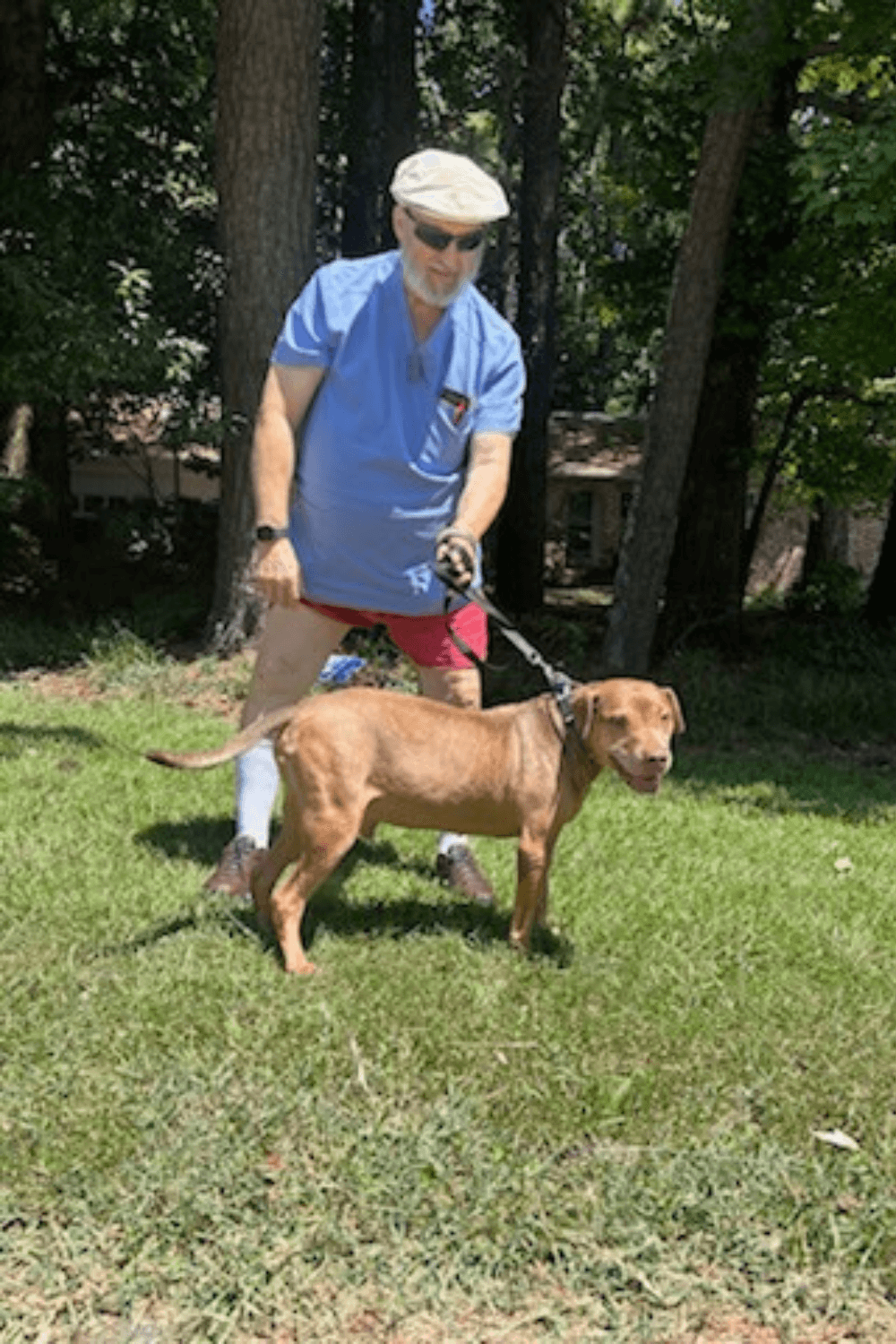
A master’s degree in the same profession was Bill’s next conquest. The Navy veteran was following a well-worn family tradition. His grandmother, mother – even his father – all were nurses.
Yet when Bill’s father was drafted in WWII he was not permitted to serve as a nurse. Instead, he was made sergeant and sent to Fort Knox to get children of Congressional members physically fit.
“Back then men were looked down on as a male nurse,” he says.
But Bill’s father did have some memorable students under his tutelage.
“First three days [he] had three graduates, all named Roosevelt,” he shares. “Teddy’s two grandkids and one of FDR’s sons.”
Bittersweet beginnings
Bill’s heritage is a fascinating tale. In 1914 his grandparents left Germany for the United States. His grandmother was pregnant at the time with Bill’s father.
But a storm caused the ship to detour to Mexico, where Bill’s grandmother gave birth. The next day she and his grandfather crossed into Brownsville, Texas.
A border agent documented the family as having entered legally and Bill’s father was treated as a legal citizen.
Yet tragedy followed when Bill’s grandmother died in Brownsville. The local community pitched in to buy his now widowed grandfather and infant son a train ticket to New York.
“Wonderful people, all there was too it. Arranged for baby food,” Bill says. “Gave my grandfather a letter to give to a group called The Forward, a Jewish newspaper. The letter said, ‘Jewish man needs wife.'”
Soon after Bill’s grandfather remarried. He raised his son, Bill’s father, with his given Jewish surname. But when Bill’s father was a teen, his father changed his last name to shield his son from anti-semitism.
Bill’s grandfather did not want his son denied entry to the college where he wanted to study to become a nurse. The long shadow of WWII and anti-semitism were everywhere.
An interesting life
Bill recounts his earliest days as related to him by his father. It was 1946 – the beginning of the McCarthy Era – when Bill was born. In a twist of sad irony, he was born at a hospital that would not hire his own father as a nurse.
In fact, baby Bill was born just shy of the hospital – in their parking lot in the back of his grandfather’s car.
“My mother was at her parents’ home about 30 miles away. Had labor pains. My grandfather drove her,” he says, and with his trademark humor adds, “I said, ‘let’s get this over with.'”
From his very first breaths on this earth Bill has forged his own, unique path.
“I’ve lived an interesting life.”
Bombs away
Bill has vivid recollections of his brief yet eye-opening Navy career.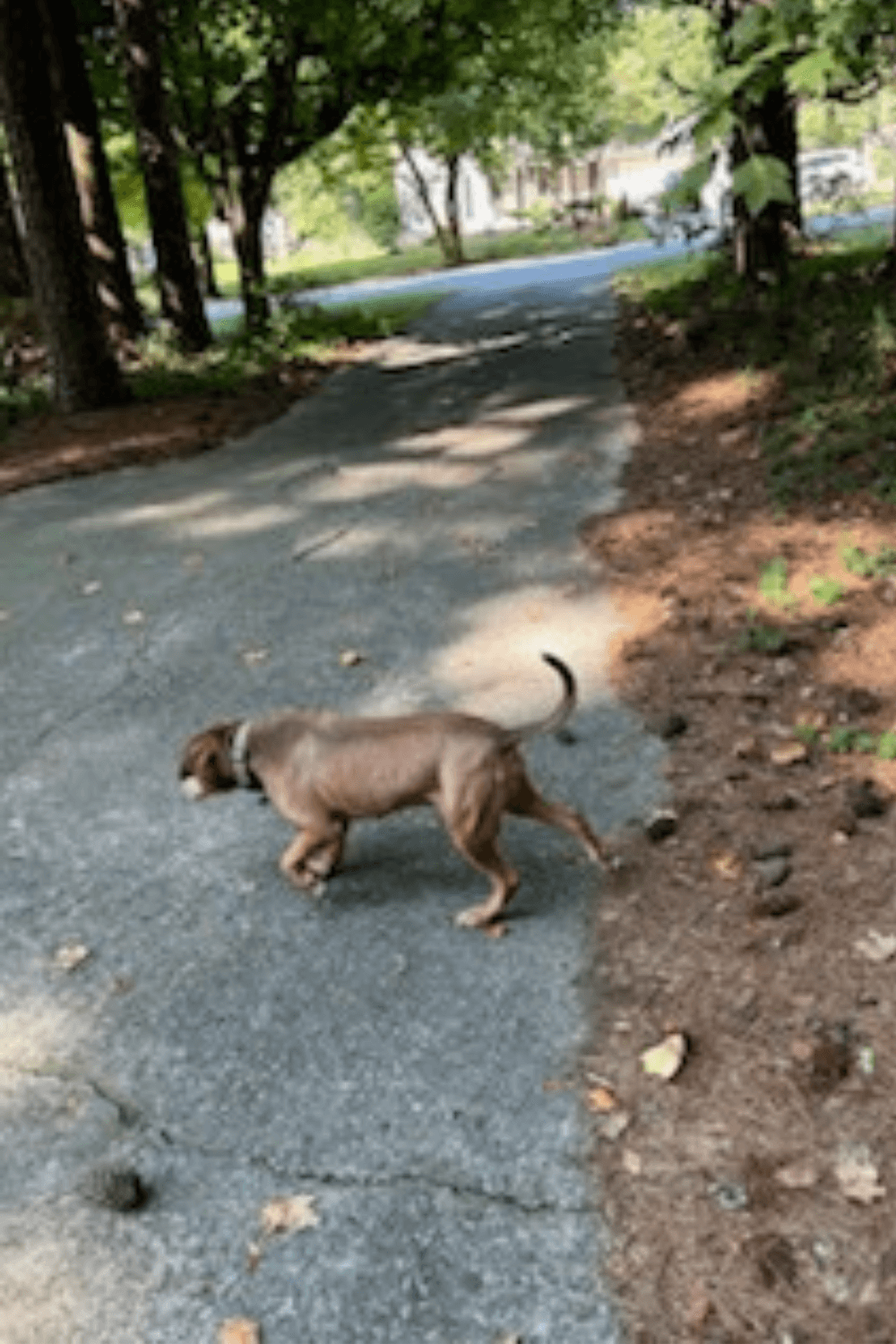
The young sailor was thrust into the heart of the war in Vietnam. He did basic training Great Lakes, Illinois before heading to A school in New London, Connecticut.
After training Bill was assigned to the USS Enterprise – a ship he describes “as long as the Empire State Building is tall.”
Although his tour of duty was six decades ago, Bill remembers it well. The Navy veteran recalls the Enterprise always having a few submarines around it. And how the first bombers would alight at midnight.
“We dropped more bombs than the Essex and Midway in 24 hours than they did in two months,” he says. “We’ve got more flight deck, more planes.”
Bill served in the Vietnam War for two years until he separated from the Navy in 1967.
Globetrotting
Through the Navy Bill saw the world. His military service marked the start of a lifelong love of travel.
“I got two trips around the world. I joined the Navy to see the world,” he says. “I did.”
Bill married in 1969, two years after his tour of duty ended.
The Navy veteran wanted to show his new bride the world he had only started to see himself. So the pair journeyed to Puerto Rico for their honeymoon. They went to Virgin Islands as well, courtesy of a friend with a plane.
After those first trips together the couple traveled whenever they could. The Navy veteran offers his simple advice to fellow travelers.
“With three things you can do so well around the world,” he shares. “‘Thank you,’ ‘you’re welcome,’ and ‘where’s the bathroom?’”
Before Bill’s wife passed away to cancer, they visited 33 countries and 41 states.
And then there were four
Except for when he was in the service Bill always had dogs in his life – even cats for a spell.
In time he remarried; his new wife had two Basset Hounds, which Bill notes soon became three. And yet another dog would follow, a handicapped Dachshund given to them by their grandson.
Bill reveled in his new life and a household filled with dogs. But in time the Navy veteran would once again become a widower after the passing of his second wife. He resolved to never marry again.
“I’m done with wives,” he says.
Home for lost souls
Bill may have sworn off marriage. Still the lifetime nurse and nurturer seems destined to always have pets in his life.
With two of the original four pets from his second marriage still at home, Bill became a temporary caretaker to pets in need.
“I fostered two parrots due to a house fire displacement and a dog Brutus from the same fire next. He was not very brutal,” he jokes. “Macaroni Tony was supposed to be euthanized – used up his 90 days. He was six months old. He outgrew me [and] knocked me down too many times. Re-homed to a college football player.”
In time the Navy veteran was ready to adopt a dog. For years he inherited pets through people in his life and fostered others in transition.
It was time for Bill to get a dog of his very own.
“You’re a nurse”
So in May 2024 the Navy veteran visited LifeLine at DeKalb County Animal Services.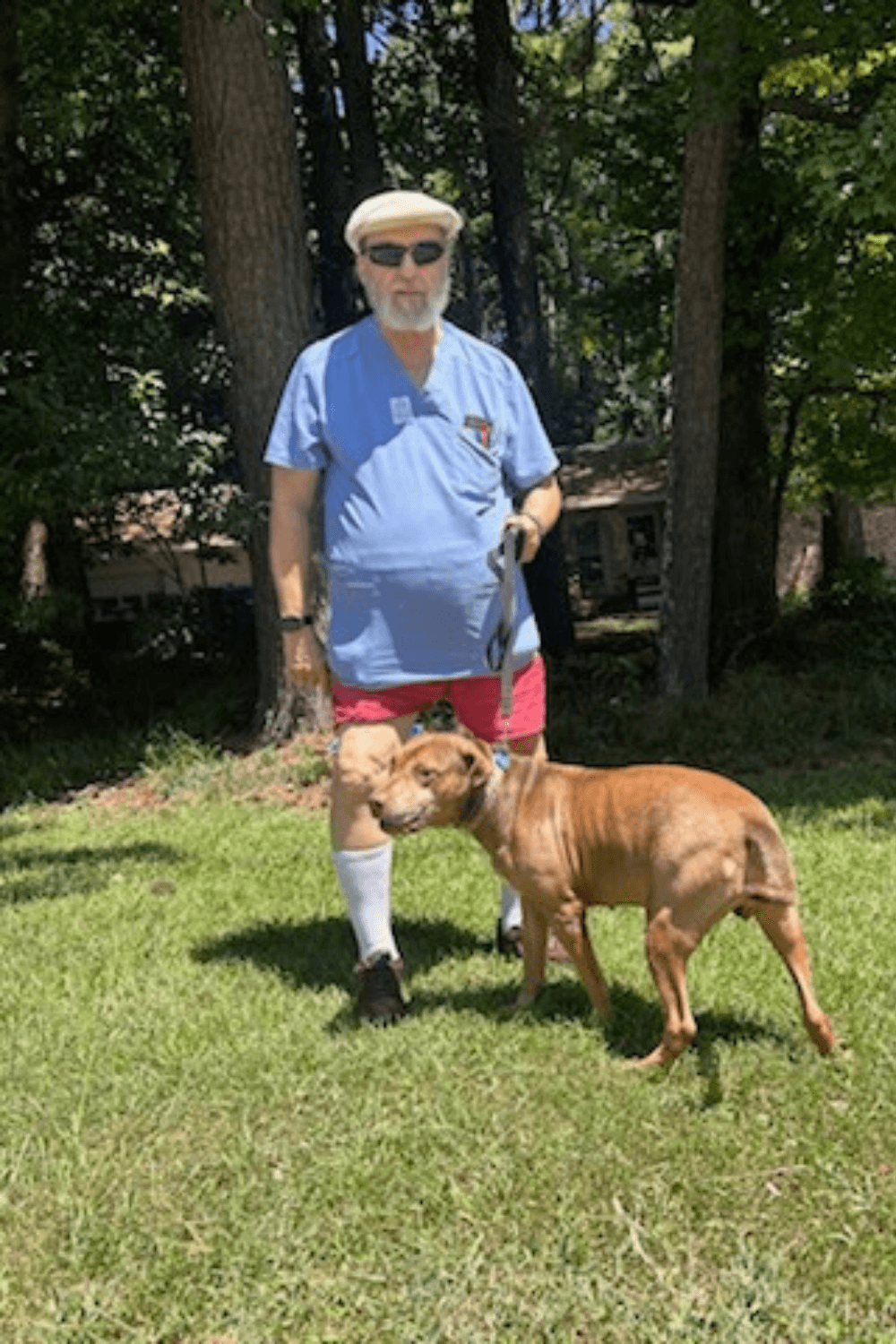
Since 2015 the shelter waives adoption fees for veterans in our program.
It is one of three participating Lifeline shelters in the greater Atlanta metro area. Together we have more than 100 adoptions across their three locations.
Bill recalls his first impression entering the shelter.
“Whole bunch of cages.”
An astute staffer struck up conversation, learning that Bill was a veteran – and a medical professional.
“‘You’re a nurse,'” he recalls the staffer saying. “‘Let’s find a dog with PTSD.’”
Invisible wounds
It was August 2023 when Snoopa came to the Dekalb shelter from an out-of-state animal welfare organization.
The large, mixed-breed dog had been seized by law enforcement in his home state. He was in bad shape upon his arrival in Georgia.
At the time Snoopa was about five years old. He had a respiratory illness and various skin issues, and was seriously underweight. Many of his teeth were worn and – most telling – he had numerous scabs, cuts, and hair loss on his face and ears.
And these were a mere handful of the dog’s visible wounds.
Yet despite Snoopa’s traumatic past he sought the company of people. He would lean into shelter volunteers for attention. He was gentle on leash and cherished slow, calm walks. And his love of treats is second only to his intense need of human companionship.
Bill will always have the heart and soul of a nurse. It is in his DNA to heal the sick and tend to the wounded.
So there was no question that Snoopa – since renamed Snoop – would go home with Bill that very day they met.
Canine PTSD
As a Vietnam veteran and a nurse, Bill recognized that Snoop had his own kind of Post Traumatic Stress Disorder, or PTSD. But the lifelong nurse has the heart, patience, and know-how to help the big dog heal.
“Snoop was a bait dog for dog fighters,” he believes. “Literally knocked his teeth out. We’re still working things out.”
PTSD is often called the invisible wounds of war. Many survivors may not have so much as an observable scratch on their bodies. Yet they suffer with mental and emotional demons that are real, and slow to heal.
Snoop shows signs of a traumatic life. He can follow Bill into a room, but if the situation is reversed he feels trapped.
As a bait dog he would have been restrained while other dogs were trained to attack him. It is a miracle that he survived at all. Many bait dogs are left to die of their wounds when they are no longer deemed useful to the people who abuse them.
Dog fighting is a felony in all 50 states and the District of Columbia. Still, these cruel, inhumane practices persist. They are fueled by vile criminal gangs – as well as spectators who consider it sport or entertainment.
Unleashing hope
Bill shares his appreciation for our work. Yet he wonders why the Veterans Administration (VA) does not do more for veterans who need help.
“Wonderful group,” he says about Pets for Patriots. “So many programs doing good things for veterans. I’d like to know why the VA is not one of them.”
But Bill sees value in our mission – unleashing hope for our nation’s heroes and shelter animals alike.
Rescue road to recovery
In the months since their adoption Bill takes comfort in the progress he and Snoop are making – together.
The lifelong nurse recounts a recent walk when Snoop pulled him in the opposite direction.
“A fawn walks right up to him and rubs noses. Daddy was just looking,” he shares. “That was that.”
But Snoop is not as assured with all the critters near his new home.
When he barks at squirrels in the yard he turns to Bill for reassurance. It is as if to ask, ‘am I doing this right?’
As a cruelty survivor it is obvious that Snoop found the perfect home to rehabilitate. A Vietnam veteran who understands invisible wounds. A proud third generation nurse devoted to Snoop’s healing.
For his part, Bill enjoys watching Snoop blossom. Through training, patience, and love, the big dog is overcoming his tragic past.
Bill is as smitten with Snoop as he was the day they met.
“Adorable,” he says of his new charge. “Cute doesn’t seem to do it for Snoop.”
Despite Snoop’s wounds, seen and unseen, adoption has been good for Bill as well. The lifelong nurse knows that sometimes the best therapy is the four-legged kind.
“It’s good,” he says, “for both veteran and pet.”


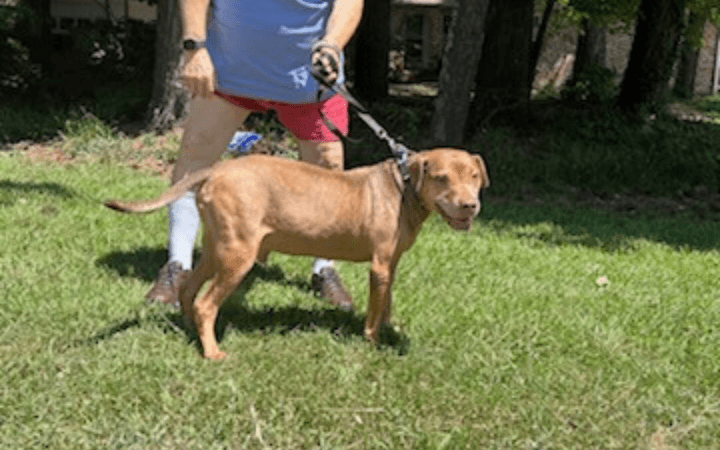

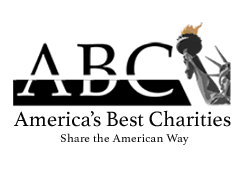
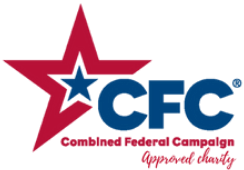





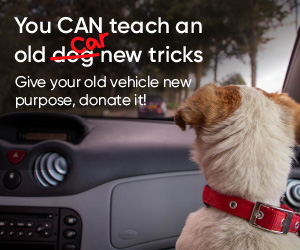
What an impressive account of a man’s life, experiences, and kindness! I’m always attracted to adoptions where the dog is any one or more of these; seniors, health or behavioral issues, targeted breed/ breed mixes, and large. They are often most difficult to find loving homes for and languish away in shelters or rescues. Thank you Bill for loving Snoop and Snoop, take good care of your Dad!!
Hey Bill,
You and I have a few things in common. I served in the navy during Viet Nam, started at Great Lakes, lost two wives to cancer, adopted a great little dog named Charlotte, share your feelings about Pets for Patriots, did a story for Wet Nose Blog and wasn’t a great student. What you have done for Snoop is amazing and certainly heart warming. Charlotte didn’t have the tough life that Snoop did, but she has become the center of my life and can’t imagine life without her around. Really enjoyed reading your story man!
I loved the story of you with Snoop. Thank God, you were meant to help heel such a nice dog who suffered for a long time before you got to him. I wish you both to have many blessings and a long life together!
I love the story of Bill and Snoop! God Bless you both. Thank you for your service Bill!
Pets for Patriots helped me get my beautiful and loving dog Ella 10 years ago, in Michigan. They are a wonderful organization and I am so glad you found your way to hem and Snoop!